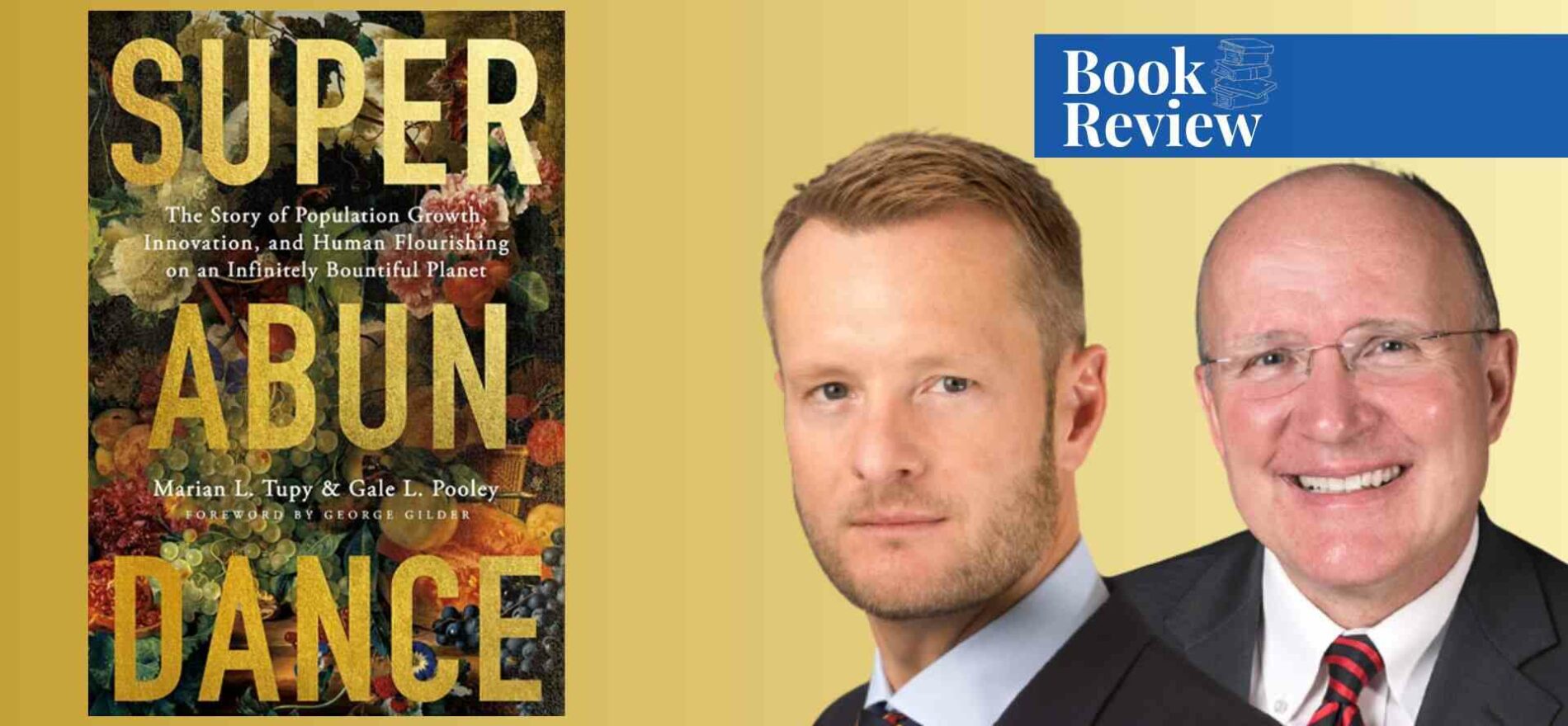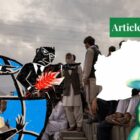Introduction
Economists have widely accepted the view that as the world progresses in terms of economic freedom, the state of our lives also get better. We live with more comfort, health, and happiness as compared to our ancestors. Certain attributes of the economic system, such as property rights, free trade and commerce, along with limited intervention from the government, all contribute to growth and development. This idea fostered when the measures of economic freedom were introduced in the 1980s. Many theorists, such as Milton Friedman, advocated this concept since then.
Superabundance: The Story of Population Growth, Innovation, and Human Flourishing on an Infinitely Bountiful Planet by Marian Tupy and Gale Pooley holds the same concept of economic freedom as being central to human growth at all fronts.
The book is divided into three parts, with each part containing multiple chapters. The first part deals with neo-Malthusian thinking and its historical roots. The second part is where the authors make their own point about how personal and population resources have grown. Here, they also introduce their concept of “time price”. They use this concept to back up their claims and arguments about progress. The third part contains the authors’ own philosophical and theoretical ideas about the concepts of growth and freedom.
Part 1: Disproving the Malthusian Theory of Population
Starting with the first part of Superabundance, Tupy and Pooley suggest that human beings have an inherent tendency for apocalyptic thinking when it comes to human progress. They give examples from previous civilizations and mythological narratives which speak of a golden era of humanity where people lived carefree. The “Garden of Eden” is one such concept found in most religious narratives. However, the problem arises when this idea is applied to the material world instead of the spiritual realm, and this is where things go downhill.
Humanity comes to be seen as something hurrying towards its decline since “falling” from that original state. However, the actual empirical evidence is of the contrary in terms of our material condition. The authors use this simple fact to show that most negative thinking is in fact a kind of overreaction to the issue of population growth.
Secondly, they state that since the period of Renaissance, the notion of human-centered progress flourished. At the same time, criticisms of progress also developed. Major criticisms of progress included ideas like the corruption of the soul or the destruction of our species at our own hands, as we move further into the future.
One reason for such thinking given by the authors is that human beings have evolved to focus on the negative more than the positive, as this helps in threat detection in natural environments. Therefore, our evolution is somewhat responsible for the pessimistic strand of thinking about human progress. The authors also delineate the legacy of optimistic thought in this regard, mentioning intellectuals such as Nicolas de Condorcet and ARJ Turgot.
One major text mentioned is “The Limits to Growth”, published in 1972 by a group of intellectuals who called themselves the “Club of Rome”. This text became the source for the standard thesis upheld even today that population growth must be limited to safeguard the planet’s resources. This pessimistic theory led to many unfortunate policies in human history, such as the rather recent one child policy of China envisioned by Song Jian, which later led to a disproportionate growth of men as compared to women in China’s overall population.
The authors explore some other examples as well to show how such an ideology can cause drastic impediments to human progress, rather than safeguarding our resources. On the other hand, the thought of Julian Simon is also discussed in detail which serves as an antidote to the Malthusian style theories that see population growth as a major threat.
Part Two: Time Price
Moving on to the second part, Tupy and Pooley outline their idea of the “time price”. This is the concept that the authors have used as a foundation for their own theory of growth. This “time price” is defined as a product’s nominal price divided by the buyer’s nominal income per hour. In simpler words, it is the amount of time required for you to work to be able to afford something.
Let us take an example to illustrate this concept. Consider that you earn 10$ an hour for performing some task. You want to buy a fancy meal which costs 30$. You would have to work for three hours to be able to afford that meal. Therefore, the time price of the meal for you is three hours. The authors say that time price is the most natural measurement in economic analysis because time is actually the only fixed resource that each one of us has on the planet.
Currency is way more arbitrary than that, and time is something that each one of us has but always in a limited way. Without time (duration), there won’t be any money-making either. The authors show that the time price for most commodities across the world have fallen down as history progresses, showing a clear sign of long-term growth rather than a decline. The authors maintain that all resources, other than time, on the planet are actually infinite and limitless due to constant innovation.
As the population grows, new minor problems arise, and then people figure out ways to manage them and deal with them more effectively. Thus, the increase in population leads to more innovation and problem-solving if people are allowed to engage in free thought and free exchanges. More people + more freedom = more innovation. This is the simple formula that is being advocated in this part of the book.
This section of the book employs much technical analyses as well, but they are beyond the scope of this review. Hence, the main conclusion has been summed up in the form of the aforementioned formula. Finally, towards the end of this section, the authors present the idea that in a wide variety of situations, the rate of increase of resources is greater than the rate of increase of population. This is called “superabundance”, and it is the direct antithesis to the Malthusian idea that population growth is exponentially greater than resource growth. Considering the state of the world so far, the Tupy and Pooley conclude that superabundance is the result expected in most of today’s economic circumstances.
Part 3: Philosophical Reflections
The third part of the book is all about philosophical reflections on the ideas already presented in the previous section. Tupy and Pooley use the concept of the “Great Enrichment” to show how superabundance is already at work. The Great Enrichment refers to the tremendous growth in the affluence of European populations since the 1750s as a result of the scientific revolution. The greatest and most effective statistic is given here, that the world’s 90% population was uncertain about the next day’s meal in 1820, and this percentage is down to 10% today. This statistic alone is enough to refute the theses upheld so far about resource depletion.
The authors state that it is the type of economic setup that matters when it comes to management of resources, not the number of people. As free markets have proven to be most effective in amplifying resource management, they are the preferred economic model (as they foster innovation and growth). Political stability, along with freedom, is also discussed as a necessary condition for growth.
The very last chapter of the third part deals with two main ideological obstacles to freedom and progress, namely Romanticism and Radical Environmentalism. The former focuses too much on human subjectivity and a nostalgia for the pastoral past, while the latter is excessively “alarmist” and overestimates the damage being done to the environment.
Reviewer’s Concluding Remarks
To sum it up, I believe that Superabundance is an ambitious and optimistic project in which the authors, Tupy and Pooley, have shown their expertise. The book has its minor problems, such as the authors falling back on evolutionary psychology to explain some trends in human beings which cannot be explained economically or politically. (This is often an easy way out, as most things can be “explained” by showing their roots in evolutionary psych).
Moreover, there are some current issues such as housing and college tuition fees which cannot be easily tackled by the time price concept. Nevertheless, the book is an interesting and informative read, full of historical coverage and fresh insights. The best thing about it is the overall message: humanity can exercise their autonomy through freedom which will ultimately steer our course towards more progress.
If you want to submit your articles and/or research papers, please check the Submissions page.
The views and opinions expressed in this article/paper are the author’s own and do not necessarily reflect the editorial position of Paradigm Shift.



















